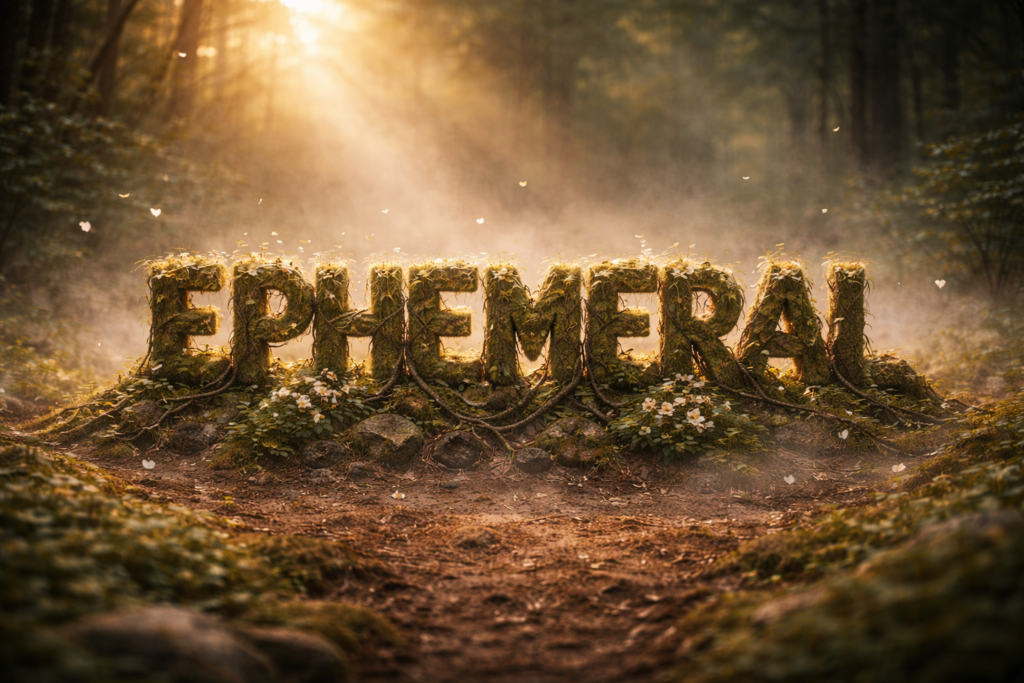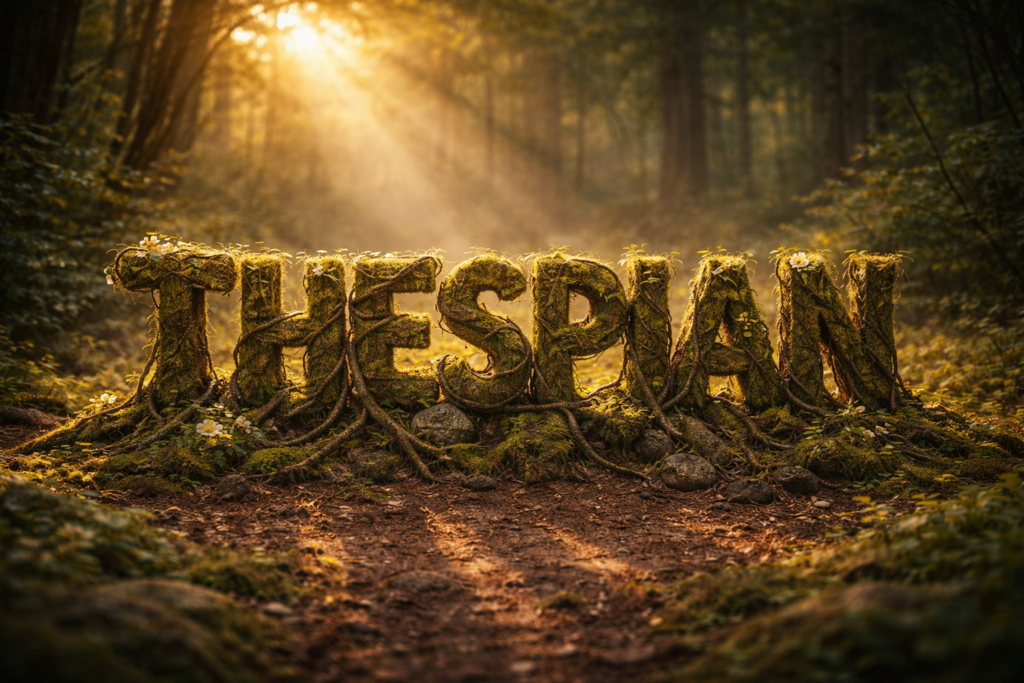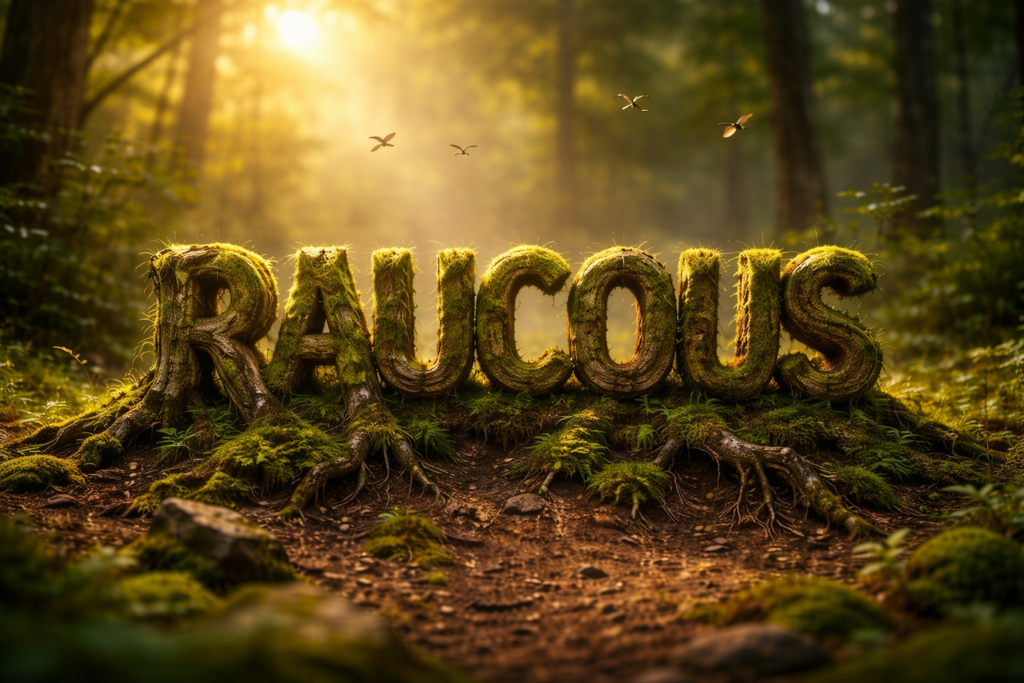Noetic

Today's Word Noetic noh-ET-ik Definition (adjective) Related to the mind, intellect, or deep understanding; involving mental activity, insight, or inner knowing. Example After hours of quiet reflection, she felt a noetic clarity that helped her solve the problem in an entirely new way. Word Origin Noetic comes from the Greek noēsis, meaning “understanding” or “intellect,” rooted in noein, “to think.” It has long been used in philosophy to describe forms of knowledge gained through thought, insight, or inner awareness rather than through physical experience. Fun Fact Modern cognitive science borrows the term noetic to describe moments of sudden understanding—those flashes of insight when a solution or idea appears all at once. Researchers have found that these “aha” moments activate unique patterns in the brain, suggesting that noetic insight is a distinct mental process separate from slow, analytical reasoning.
Ephemeral

Today's Word Ephemeral ih-FEM-er-uhl Definition (adjective) Lasting for a very short time; fleeting or brief. Example The beauty of the rainbow was ephemeral, fading from the sky just minutes after it appeared. Word Origin Ephemeral comes from the Greek ephemeros, meaning “lasting only a day.” The term originally described short-lived natural events—like morning dew or certain insects that survive for just one sunrise—before expanding to anything that disappears quickly. Fun Fact Some of the world’s most spectacular natural events are profoundly ephemeral. Desert wildflowers, for example, may wait years for the perfect rainfall before blooming all at once in breathtaking “super blooms” that vanish within days. These rare explosions of color appear suddenly, draw global attention, and then fade almost as quickly as they came—perfect reminders of how beauty often exists only for a moment.
Thespian

Today's Word Thespian THESS-pee-uhn Definition (noun) An actor or actress; someone who performs on stage or in dramatic works. Example Even as a child, Maya showed thespian talent, turning every living-room corner into her own private stage. Word Origin Thespian comes from Thespis, a Greek performer from the 6th century BCE who is often credited as the first actor in theatrical history. Before him, performances were sung or spoken collectively, but Thespis introduced the idea of stepping out from the chorus to speak as an individual character — a shift that shaped all of Western drama. Fun Fact In ancient Greek theater, actors wore masks not just for visibility but for amplification. The carved, open-mouthed masks acted like early megaphones, projecting the actor’s voice across huge outdoor amphitheaters that held thousands of people. Modern acoustic studies show these masks genuinely enhanced sound, helping early thespians reach the back rows without any form of technology.
Occlude

Today's Word Occlude uh-KLOOD Definition (verb) To block, close off, or obstruct something so it cannot pass through. Example During the storm, fallen branches occluded the narrow trail, making it impossible to pass. Word Origin Occlude comes from the Latin occludere, meaning “to shut up” or “to close off.” The root is formed from ob- (“toward”) and claudere (“to close”), giving the sense of something being sealed or blocked firmly and completely. Fun Fact In dentistry, the word occlusion describes the way your upper and lower teeth meet when you bite down. Proper alignment allows food to be chewed efficiently, but even a small shift in tooth position can occlude the natural bite pattern. This is why orthodontists study tiny millimeter-level changes—they can dramatically affect speech, chewing, and jaw comfort. The same idea appears in science and engineering: even a minor obstruction can completely alter how a system flows.
Fulsome

Today's Word Fulsome FUL-sum Definition (adjective) Excessive to the point of being insincere; overly flattering or abundant in a way that feels uncomfortable. Example Her fulsome compliments were so over the top that everyone in the room sensed she didn’t mean a word of them. Word Origin Fulsome comes from Middle English, where full meant “abundant.” Originally positive, the term gradually shifted to imply overabundance, and by the 17th century it took on its modern meaning: so much of something that it becomes unpleasant or false. Fun Fact In medieval courts, flattery wasn’t just social— it was strategic. Nobles often exaggerated praise to absurd levels to gain favor, protection, or political advantage. Historians note that entire diplomatic negotiations were built on excessive, theatrical compliments, so inflated that they read today like satire. This cultural tradition helped shape our modern idea of “fulsome praise” as something that feels flattering on the surface…but carries an uncomfortable edge underneath.
Despot

Today's Word Despot DES-puht Definition (noun) A ruler who holds absolute power, often using it in a harsh or oppressive way. Example The novel’s villain is a despot who crushes any hint of dissent to maintain his grip on power. Word Origin Despot comes from the Greek despotēs, meaning “master” or “one with authority.”Originally neutral, the word eventually shifted to describe rulers whose unchecked power became abusive. Fun Fact Throughout history, many despots used architecture as psychological control.By constructing oversized gates, towering statues, and enormous throne or ball rooms, they created environments designed to make citizens feel small — and constantly watched.Modern behavioral scientists now recognize this as a powerful method for shaping public obedience without ever issuing a spoken threat.
Raucous

Today's Word Raucous RAW-kus Definition (adjective) Loud, harsh, and disorderly; boisterous in a rough or disruptive way. Example The forest erupted in a raucous chorus of crows as hikers approached the clearing. Word Origin From Latin raucus, meaning “hoarse” or “harsh-sounding.” Fun Fact Raucous describes more than just volume — it captures texture. The word is often used for sounds that are gritty or abrasive: shouting crowds, squabbling birds, rowdy laughter, or stormy winds tearing through branches. In nature writing, it’s a favorite term to evoke the wild, unpolished clamor of life that refuses to be quiet.
Solipsistic

Today's Word Solipsistic so-lip-SIS-tik Definition (adjective) Relating to the philosophical idea that only one’s own mind is sure to exist; extremely self-focused or unaware of others. Example His solipsistic worldview made genuine connection difficult—everything seemed to revolve around his own thoughts and perceptions. Word Origin From Latin solus (“alone”) + ipse (“self”), literally meaning “the self alone.” Fun Fact Solipsism is one of philosophy’s most unsettling concepts: the idea that the external world might be an illusion created by your own mind. While few people truly believe this, the adjective solipsistic is used far more broadly—often to describe someone who is overly self-centered or oblivious to perspectives outside their own. It’s the mindset where the world quietly shrinks to a single point of view.
Fatuous

Today's Word Fatuous FATCH-oo-us Definition (adjective) Silly, foolish, or pointless — especially in a complacent or smug way. Example His fatuous remarks during the meeting only made the situation more awkward. Word Origin From Latin fatuus, meaning “foolish” or “simple-minded.” Fun Fact Unlike plain foolishness, fatuous behavior carries an air of unaware self-satisfaction. Think of someone making bold, confident claims that are wildly misguided. Philosophers like Nietzsche used the term to critique shallow thinking disguised as wisdom. In modern usage, it often describes comments, arguments, or decisions that are foolish precisely because the person delivering them believes they are clever.
Metanoia

Today's Word Metanoia met-uh-NOY-uh Definition (noun) A profound transformation or change of mindset; a spiritual or psychological conversion. Example Traveling alone for a year sparked a deep metanoia, reshaping her priorities and sense of purpose. Word Origin From Greek meta- (“beyond” or “after”) + noia (“mind”), meaning “a shift of mind.” Fun Fact In ancient Greek philosophy, metanoia described a dramatic inner turning—a complete reorientation of how one sees the world. Today, psychologists associate the idea with breakthrough moments: sudden clarity after confusion, healing after loss, or the realization that your life must move in a new direction. Many cultures describe similar concepts—from epiphanies to spiritual awakenings—reflecting humanity’s timeless desire to grow beyond who we once were.
